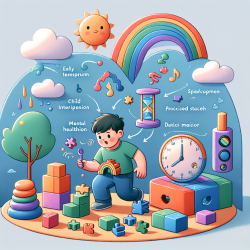Introduction
As practitioners in the field of speech-language pathology, we are constantly seeking ways to enhance our understanding and improve the outcomes for children, particularly those with an increased likelihood of autism spectrum disorder (ASD). A recent study published in Frontiers in Psychology, titled "Temperament in Infancy Predicts Internalizing and Externalizing Problem Behavior at Age 5 in Children With an Increased Likelihood of Autism Spectrum Disorder," provides valuable insights into the role of early temperament in predicting future behavioral outcomes.
Understanding the Research
The study followed 178 children who were at an increased likelihood of being diagnosed with ASD, focusing on their temperament at 6, 12, and 24 months of age. Using the Infant Behavior Questionnaire (IBQ) and the Toddler Behavior Assessment Questionnaire-Revised (TBAQ-R), researchers assessed temperament and its correlation with internalizing and externalizing behaviors at age 5, as measured by the Child Behavior Checklist (CBCL).
Key Findings
- Four out of six IBQ subscales at both 6 and 12 months significantly predicted internalizing and externalizing problems at age 5.
- Nine and eight of the 13 TBAQ-R subscales at 24 months significantly predicted internalizing and externalizing problems, respectively, at age 5.
- A "sticky attention" temperament profile significantly predicted internalizing problems, whereas a "low-focused" profile significantly predicted externalizing problems at age 5.
Implications for Practitioners
These findings underscore the importance of early temperament assessment in identifying children at risk for later mental health challenges. For practitioners, this means:
- Early Identification: Monitoring temperament in infancy can help identify children who may benefit from early interventions, even before behavioral problems manifest.
- Targeted Interventions: Understanding a child's temperament profile can guide the development of personalized intervention strategies that address specific risk factors for internalizing or externalizing behaviors.
- Family Support: Educating families about the role of temperament in child development can empower them to support their child's emotional and behavioral regulation from an early age.
Encouraging Further Research
While this study provides significant insights, it also highlights the need for further research to explore the nuances of temperament and its impact on mental health outcomes. Practitioners are encouraged to engage in or support research efforts that investigate the longitudinal effects of early temperament and the efficacy of targeted interventions.
Conclusion
Understanding the link between early temperament and later behavioral outcomes is crucial for improving the lives of children at risk for ASD and other developmental challenges. By integrating these insights into practice, we can better support children and their families, paving the way for healthier developmental trajectories.
To read the original research paper, please follow this link: Temperament in Infancy Predicts Internalizing and Externalizing Problem Behavior at Age 5 in Children With an Increased Likelihood of Autism Spectrum Disorder.










